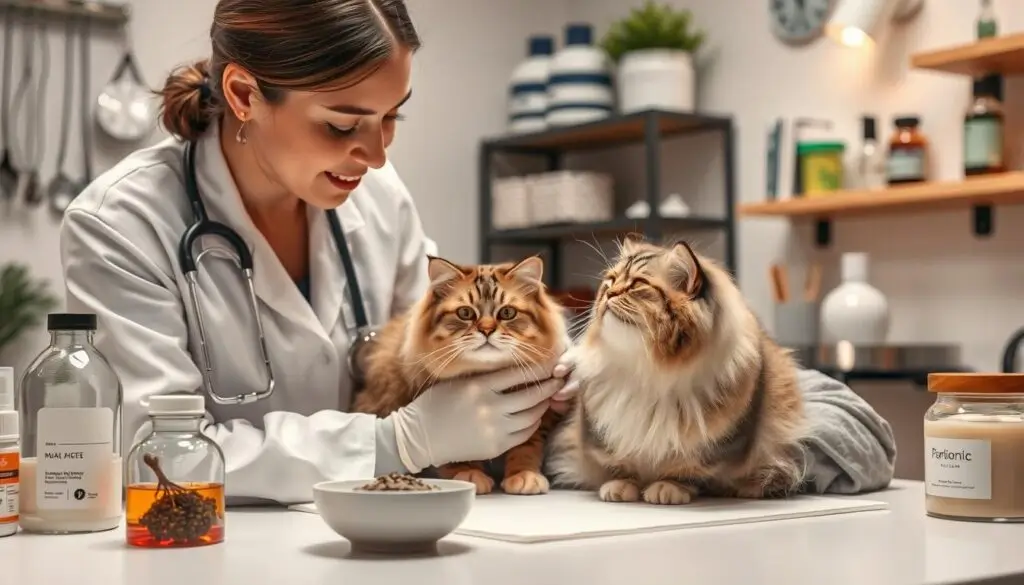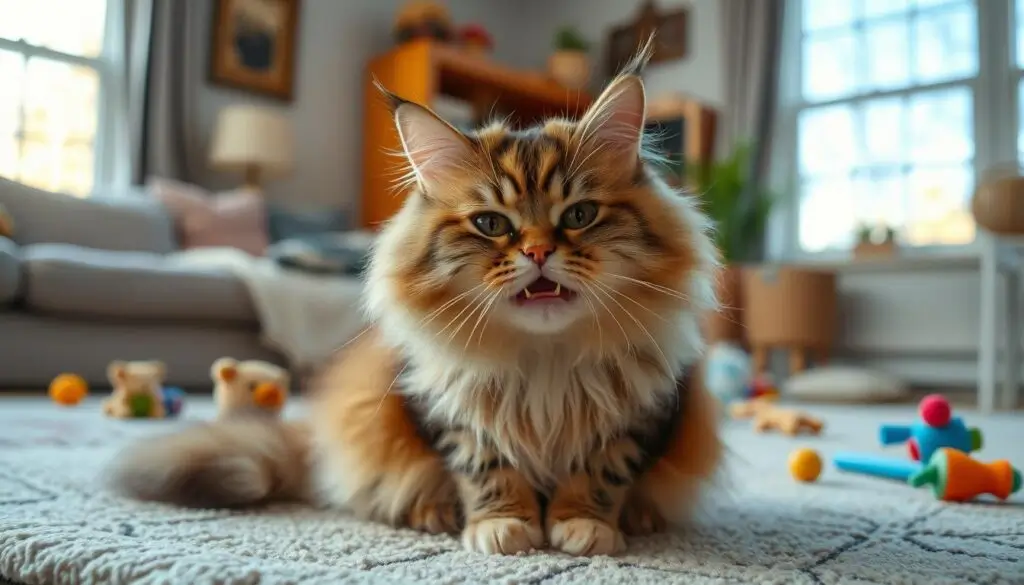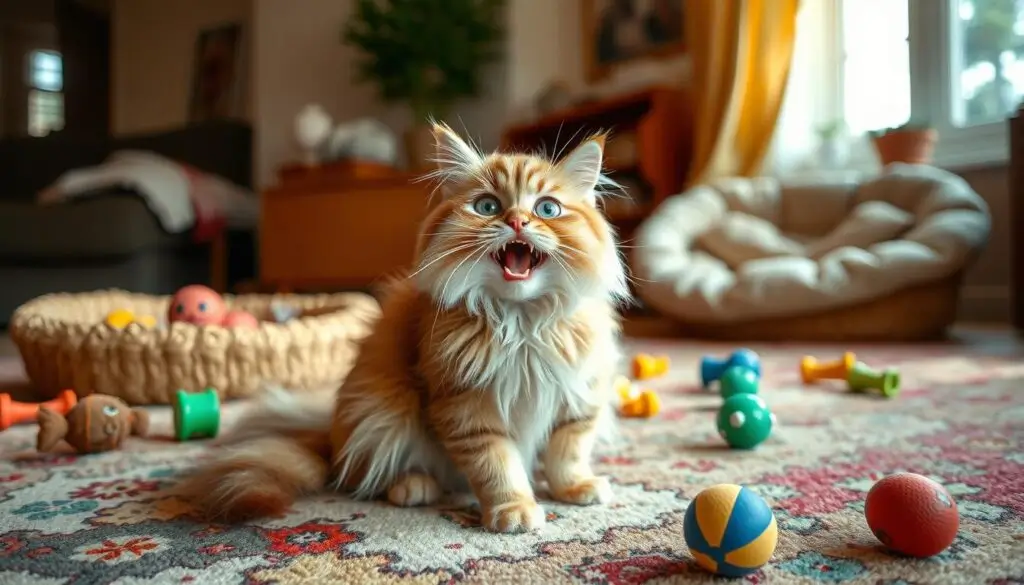Coughing Cat: Here’s What You Need to Know
If your cat is coughing, it’s important to find out why. Coughing can be due to many things like infections, asthma, or hairballs. These can cause serious coughing in cats if not treated. As a cat owner, knowing the signs and getting vet help is key.
Seeing your cat cough regularly or showing signs of infection like eye or nose discharge means you need vet help. Knowing what causes coughing in cats, like heartworms or tumors, helps you act fast. Whether it’s a mild or serious cough, getting your cat to the vet is crucial for their health.
Table of Contents
Key Takeaways
- Recognize the signs of a coughing cat, including discharge from the eyes or nose and rapid breathing.
- Understand the common causes of coughing in cats, such as respiratory infections and asthma.
- Seek veterinary care for effective cat cough treatment and to rule out underlying health concerns.
- Regular veterinary checkups and up-to-date vaccines are crucial in reducing the chance of respiratory diseases in cats.
- Annual parasite prevention, including heartworm protection, can help prevent coughing associated with infectious causes in cats.
- Monitor your cat’s behavior and watch for persistent or severe coughing, which may require immediate veterinary intervention.
Understanding Why Cats Cough
As a cat owner, it’s key to know when your cat is coughing and why. Cats cough for many reasons, affecting about 10-20% of them each year. It’s important to tell if your cat’s cough is dry or wet, and if they have other symptoms like sneezing or runny eyes.
There are many reasons why cats cough. Feline upper respiratory infections (URI) are contagious and common in places with many cats. Kittens and older cats are more at risk, with some needing hospital care for their breathing problems.
At times, you might need to find cat wheezing remedies to help your cat feel better. But always talk to a vet to find the right treatment. Understanding your cat’s cough and getting vet advice can help them get better.
Different Types of Cat Coughs
Cats can cough in different ways. A dry cough sounds like hacking or scratching. A wet cough sounds like gurgling or bubbling. Knowing the type of cough helps you treat it right.
When to Be Concerned About Your Cat’s Cough
If your cat’s cough lasts more than a few days or comes with other symptoms, see a vet. Also, if they have trouble breathing or seem distressed, get help right away.
Normal vs. Abnormal Coughing in Cats
Coughing can be normal for cats, but not always. If your cat coughs a lot or seems really sick, it might be a sign of a bigger problem. Watching your cat closely can help you catch health issues early.
Common Signs of a Coughing Cat
As a cat owner, it’s key to know the signs of a coughing cat. These include cat coughing up hairballs and persistent cough in cats. These signs might mean your cat has a health problem that needs a vet’s help. Studies show about 80% of cat owners have seen their cats cough at least once.
Some common signs of a coughing cat include:
- Coughing
- Sneezing
- Runny eyes
- Difficulty breathing
Cats may also cough up hairballs, which could mean a respiratory issue. If your cat keeps coughing, it’s important to get vet care. This helps find out if there’s a health problem.
About 50% of cats over two have hairball-related coughs. Also, feline asthma affects 1-5% of cats. It causes chronic airway inflammation and coughing.
Watching your cat for coughing signs is crucial. Persistent cough in cats can mean a health issue. By noticing these signs and getting vet care, you can keep your cat’s breathing healthy.
| Common Signs of a Coughing Cat | Prevalence |
|---|---|
| Coughing | 80% |
| Sneezing | 70% |
| Runny eyes | 50% |
| Difficulty breathing | 40% |
Distinguishing Between Coughing and Hairballs
As a cat owner, knowing the difference between a coughing cat and a cat coughing up hairballs is key. Both can worry you, but they need different actions. Hairballs are common but can be a problem if they happen too often.
Experts say hairballs shouldn’t happen more than once a month. If your cat has them more often, it might mean they’re grooming too much or have long fur. Watch your cat closely and see a vet if hairballs are a big issue.
Signs of hairball coughing include gagging, retching, and coughing up a hairball. It’s important to tell these apart from signs of a coughing cat with a breathing problem. Laxatone, a hairball treatment, helps by making stomach contents easier to pass.
Characteristics of Hairball-Related Coughing
- Gagging and retching
- Coughing up a hairball
- Frequent vomiting or regurgitation
When Hairballs Become Problematic
If your cat shows any of these signs, it’s time to see a vet:
| Symptom | Description |
|---|---|
| Frequent hairballs | More than once a month |
| Difficulty swallowing | Pain or discomfort while eating |
| Vomiting or regurgitation | Frequent or persistent |
Knowing the difference between a coughing cat and a cat coughing up hairballs helps you care for your cat better. This way, your cat can stay healthy and happy.
Medical Causes Behind Your Cat’s Cough
As a cat owner, it’s key to know why your cat coughs. Cat cough treatment varies based on the cause. This can be anything from respiratory infections to asthma. If your cat coughs a lot, get vet care to find out why.
Common coughing cat causes include respiratory infections, asthma, and bronchitis. These can lead to coughing, wheezing, and breathing trouble. Sometimes, a cough can mean a serious issue like pneumonia or lung lymphoma.
Working with your vet is crucial to find your cat’s cough cause. They’ll help create a cat cough treatment plan. This might include meds, lifestyle changes, and regular check-ups. Knowing the cause helps you care for your cat better.

In some cases, coughing cat causes come from the environment. This could be allergens or pollutants. If you think this, talk to your vet to find and avoid these triggers. Taking care of your cat’s health can prevent coughs and keep them happy and healthy.
Environmental Factors That Trigger Cat Coughing
As a cat owner, it’s key to know that the environment can affect your cat’s health. Indoor air quality issues like dust, pollen, and mold can lead to coughing in cats. It’s important to find and fix these problems to help your cat.
Cats can get seasonal allergies, which can make them cough. Household irritants, like cleaning products and tobacco smoke, can also harm their breathing. By keeping these irritants away, you can help your cat feel better.
Some common things that can make cats cough include:
- Indoor air pollution
- Seasonal allergies
- Household irritants, such as cleaning products and tobacco smoke
To help your cat, you need to reduce their exposure to these problems. This can help stop their coughing and improve their health and happiness.
| Environmental Factor | Effect on Cats |
|---|---|
| Indoor air pollution | Can trigger coughing and other respiratory problems |
| Seasonal allergies | Can trigger coughing and other respiratory symptoms |
| Household irritants | Can contribute to cat respiratory issues |
When to Take Your Coughing Cat to the Vet
If your cat keeps coughing, it’s important to know when to go to the vet. A coughing cat might have a serious health problem. Quick action is key to avoid bigger issues.
Look for signs like a cough that doesn’t go away, sneezing, runny eyes, or trouble breathing. If you see these, it’s time to visit the vet.
The vet will find out why your cat is coughing and give the right cat cough treatment. The cough could mean a respiratory infection, asthma, or heart disease. Regular vet visits can stop health problems and keep your cat’s breathing safe.
Some signs your cat needs the vet right away are:
- Difficulty breathing
- Cyanosis (a bluish tint to the gums)
- Severe coughing
- Lethargy
- Reduced appetite

Going to the vet quickly can help your cat get better and avoid serious problems. Remember, a cough in cats can mean a big health issue. Early treatment is crucial for your cat’s breathing health.
| Cause of Coughing | Symptoms | Treatment |
|---|---|---|
| Respiratory Infection | Coughing, sneezing, runny eyes | Antibiotics, cough suppressants |
| Asthma | Coughing, wheezing, difficulty breathing | Steroids, bronchodilators |
| Heart Disease | Coughing, difficulty breathing, lethargy | Medications to manage heart failure |
Treatment Options for Feline Coughs
Dealing with a coughing cat depends on the cause. If it’s a viral infection like feline herpesvirus or calicivirus, treatment aims to manage symptoms and boost the immune system. For bacterial causes, antibiotics are often prescribed.
Home remedies like steam inhalation or humidifiers can help with mucus and coughing. But, always talk to a vet to find the right treatment for your cat.
Some common treatments for feline coughs include:
- Antibiotics to treat bacterial infections
- Anti-inflammatory medications to reduce swelling and discomfort
- Bronchodilators to help open up airways and improve breathing
There are also home remedies to support your cat’s recovery. These include a warm, comfy space, lots of water, and a humidifier to add moisture to the air.
| Treatment Option | Description |
|---|---|
| Medical Treatment | Antibiotics, anti-inflammatory medications, and bronchodilators |
| Home Remedies | Steam inhalation, humidifiers, warm environment, and plenty of water |
Preventing Respiratory Issues in Cats
As a cat owner, you have a big role in stopping cat respiratory issues. Taking steps ahead can lower your cat’s chance of getting respiratory problems. One key way is to keep your cat away from things that can irritate their lungs, like dust, pollen, and mold.
Regular vet visits are also key. Vaccines and check-ups can spot health issues early. Plus, keeping your cat inside can lower the risk of respiratory problems. Outdoor cats are more likely to meet infected cats or fungi.
It’s vital to know when your cat might be having trouble breathing. Look out for signs like coughing, sneezing, and trouble breathing. If you see these, get vet help fast. By doing these things, you can keep your cat healthy and happy.
Some important ways to stop respiratory issues in cats include:
- Reducing exposure to environmental irritants
- Providing regular veterinary care
- Keeping your cat indoors
- Recognizing signs of respiratory distress, such as how to help a coughing cat
By following these tips, you can lower the risk of respiratory problems. This ensures your cat stays healthy. Remember, prevention is key. By being proactive, you can help your cat live a long and happy life.
| Prevention Method | Description |
|---|---|
| Reducing exposure to environmental irritants | Minimizing your cat’s exposure to dust, pollen, and mold can help prevent respiratory issues |
| Providing regular veterinary care | Regular vaccinations and check-ups can help identify potential health problems early on |
| Keeping your cat indoors | Keeping your cat indoors can help minimize the risk of respiratory problems |
Natural Remedies to Support Cat Respiratory Health
As a cat owner, you want your pet’s respiratory health to be top-notch. If your cat coughs up hairballs or has a persistent cough, natural remedies can help. A healthy diet and supplements are key to supporting your cat’s respiratory system.
Adding omega-3 fatty acids and antioxidants to your cat’s diet can reduce inflammation. This helps keep their respiratory system healthy. You can also consider probiotics and vitamin C to boost their immune system and prevent respiratory problems.
Diet Modifications
A balanced diet is vital for your cat’s health, including their respiratory system. Look for foods with:
- Omega-3 fatty acids
- Antioxidants
- Whole grains
- Lean protein sources
Supplements and Herbs
Along with a healthy diet, certain supplements and herbs can aid your cat’s respiratory health. Some options include:
- Probiotics
- Vitamin C
- Eucalyptus
- Peppermint
By adding these natural remedies to your cat’s routine, you can boost their respiratory health. This can help prevent persistent coughs. Always talk to your vet before changing your cat’s diet or adding supplements.
Long-Term Management of Chronic Cat Coughs
As a cat owner, managing your coughing cat‘s chronic cough is a long-term commitment. It’s crucial to work with your vet to create a cat cough treatment plan. This plan might include medicines like antibiotics and anti-inflammatory drugs. It also might include changes in your cat’s lifestyle, such as avoiding irritants and feeding a healthy diet.
Some important things to consider for long-term management are:
- Regular vet visits to keep an eye on your cat’s health
- Following your vet’s advice on medication
- Keeping your home smoke-free to avoid irritants
By taking these steps and working with your vet, you can manage your coughing cat‘s chronic cough. This will help improve their overall health. Remember, every cat is unique, so your cat cough treatment plan should be tailored to your cat’s specific needs.
With the right approach and commitment to your cat’s health, you can help them breathe easier. This will make their life happier and healthier.
| Condition | Symptoms | Treatment |
|---|---|---|
| Chronic Bronchitis | Coughing, hacking, labored breathing | Antibiotics, steroids, cough medication, bronchodilators |
| Asthma | Persistent coughing, fast or open-mouthed breathing, noisy breathing | Anti-inflammatory drugs, bronchodilator therapy |
Conclusion: Ensuring Your Cat’s Respiratory Wellness
Keeping your cat’s respiratory system healthy is key to their happiness. By avoiding harmful environments and regular vet visits, you can help them stay well. If your cat coughs a lot or shows other breathing problems, see a vet right away.
With the right care, your cat can breathe easily and live a happy life. This includes reducing exposure to harmful things and supporting their breathing system. Always watch for signs of trouble and act fast to keep your cat healthy.

